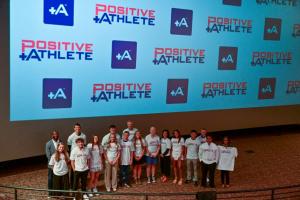Positive Athlete Names 'Most Positive' Athletes in Colorado for the 2025 School Year
High Schoolers Recognized at Awards Experience with Special Guest Pro Football Hall of Famer and Positive Athlete's Lead Athlete Champ Bailey
Optimistic
Puts Team First
Encouraging
Respectful
Admits Imperfections
True Heart for Others
Embraces Service
This year, Positive Athlete named 14 different Colorado high schoolers as the Top 7 “Most Positive” male and female student-athletes across the state, while also recognizing with two coaches and one athletic director as “Most Positive” within their respective areas. The Top 7 theme stems from the number of attributes (7) called out above.
More than 440 nominations from coaches, principals, athletic directors, teachers, and parents were submitted for the Positive Athlete program state-wide, representing 197 different public and private high schools (equivalent to 53% of all Colorado high schools with formalized athletics programs). Nominations covered all 27 state sanctioned sports as well as e-sports, archery, equestrian, martial arts, motocross, ultimate, Unified Sports, and more. The Colorado awards are part of the national expansion of Positive Athlete, which was created by sports industry veteran Scott Pederson in the early 2010’s as a movement for more positivity in youth sports. In addition to excellence on the field, each nominated Positive Athlete was required to show the above characteristics in order to be nominated.
Here is a list of the 2024-2025 State Award Winners:
NAME AND HIGH SCHOOL
Alex Beasley, Lewis-Palmer (Monument, CO)
Avery Leman, Poudre (Fort Collins, CO)
Jaden Francis, Elizabeth (Elizabeth, CO)
Jay Peltier (coach), Summit (Breckenridge, CO)
Katherine Lorck, Cheyenne Mountain (Colorado Springs, CO)
Kevin Prosser III, Rangeview (Aurora, CO)
Kinsley Mayo, La Junta Jr/Sr (La Junta, CO)
Liam Graham, Standley Lake (Westminster, CO)
Megan Waters, Lakewood (Lakewood, CO)
Peighton Marrero, Strasburg (Strasburg, CO)
Ray Lopez (coach), Abraham Lincoln (Denver, CO)
Rhett McDonald, Wiley (Wiley, CO)
Roxann Serna (AD), Centennial (San Luis, CO)
Ryan Cornell, Longmont (Longmont, CO)
Sage Adkins, Rock Canyon (Littleton, CO)
Simon Lunsford, Green Mountain (Lakewood, CO)
Staia Yohe-Savage, George Washington (Denver, CO)
All of these award winners were recognized at the 2025 Colorado Positive Athlete Awards on June 2 at DCSD Legacy Campus, with special guest Pro Football Hall of Famer and Positive Athlete’s Lead Athlete Champ Bailey.
“I’d seen their Positive Athlete nominations and bios but meeting and celebrating the winners in person exceeded all expectations,” said Bailey. “It’s easy to see why they are the future leaders in their communities and the workforce. I’m excited to follow them as they lean in to take advantage of the ever-growing resources offered by Positive Athlete—not just to winners but to all nominees.”
Five scholarships were awarded, totaling $8,000. These recipients included Avery Leman winning the female O.P.E.R.A.T.E Award and Liam Graham winning the male O.P.E.R.A.T.E. Award, each receiving $2,500 toward the academic institution or trade school of their choice. Additionally, Kinsley Mayo, Rhett McDonald and Staia Yohe-Savage received Positivity Champ Awards including a $1,000 scholarship.
Nominations will reopen in the Fall for next school year but Positive Athlete is currently taking pre-nominations at www.PositiveAthlete.org, which will trigger an automatic reminder when nominations reopen.
About Positive Athlete
Positive Athlete, Inc. is a national organization dedicated to promoting positivity in youth athletics through awards, scholarships, and leadership opportunities. The program highlights student-athletes who inspire through their character, commitment, and resilience. Nationally, more than $100,000 in scholarships will be awarded by Positive Athlete for the 2024-2025 school year.
Visit Positive Athlete Mountain Region on social media:
# # #
Brady Kellogg
Positive Athlete
+1 303-775-9599
email us here
Legal Disclaimer:
EIN Presswire provides this news content "as is" without warranty of any kind. We do not accept any responsibility or liability for the accuracy, content, images, videos, licenses, completeness, legality, or reliability of the information contained in this article. If you have any complaints or copyright issues related to this article, kindly contact the author above.
Valor Tax Relief Expands Nationwide Presence While Founder Karim Hanna Builds Community and Gives Back Globally
American haute couture documentary up for accolades
After Nearly 30 Years of Service, Greentrike CEO to Pass the Torch
Więcej ważnych informacji
 Jedynka Newserii
Jedynka Newserii

 Jedynka Newserii
Jedynka Newserii

Konsument

Polacy nie korzystają z hossy trwającej na warszawskiej giełdzie. Na wzrostach zarabiają głównie inwestorzy zagraniczni
Od października 2022 roku na rynkach akcji trwa hossa, nie omija ona także warszawskiej giełdy. Mimo to inwestorzy indywidualni odpowiadają zaledwie za kilkanaście procent inwestycji, a o wzrostach decyduje i na nich zarabia głównie kapitał z zagranicy. Widać to również po napływach i odpływach do i z funduszy inwestycyjnych. Zdaniem Tomasza Koraba, prezesa EQUES Investment TFI, do przekonania Polaków do inwestowania na rodzimej giełdzie potrzeba zysków z akcji, informacji o tych zyskach docierającej do konsumentów oraz czasu.
Polityka
Obowiązek zapełniania magazynów gazu w UE przed sezonem zimowym ma zapewnić bezpieczeństwo dostaw. Wpłynie też na stabilizację cen

Unia Europejska przedłuży przepisy z 2022 roku dotyczące magazynowania gazu. Będą one obowiązywać do końca 2027 roku. Zobowiązują one państwa członkowskie do osiągnięcia określonego poziomu zapełnienia magazynów gazu przed sezonem zimowym. Magazyny gazu pokrywają 30 proc. zapotrzebowania Unii Europejskiej na niego w miesiącach zimowych. Nowe unijne przepisy mają zapewnić stabilne i przystępne cenowo dostawy.
Infrastruktura
Gminy zwlekają z uchwaleniem planów ogólnych zagospodarowania przestrzennego. Może to spowodować przesunięcie terminu ich wejścia w życie

Reforma systemu planowania i zagospodarowania przestrzennego rozpoczęła się we wrześniu 2023 roku wraz z wejściem w życie większości przepisów nowelizacji ustawy z 27 marca 2003 roku. Uwzględniono w niej plany ogólne gminy (POG) – nowe dokumenty planistyczne, za których przygotowanie mają odpowiadać samorządy. Rada Ministrów w kwietniu br. uchwaliła jednak ustawę o zmianie ustawy z 7 lipca 2023 roku, a jej celem jest zmiana terminu obowiązywania studiów uwarunkowań i kierunków zagospodarowania przestrzennego gmin na 30 czerwca 2026 roku. Wskazana data może nie być ostateczna z uwagi na to, że żadna z gmin nie uchwaliła jeszcze POG.
Partner serwisu
Szkolenia

Akademia Newserii
Akademia Newserii to projekt, w ramach którego najlepsi polscy dziennikarze biznesowi, giełdowi oraz lifestylowi, a także szkoleniowcy z wieloletnim doświadczeniem dzielą się swoją wiedzą nt. pracy z mediami.









.gif)

 |
| |
| |
|